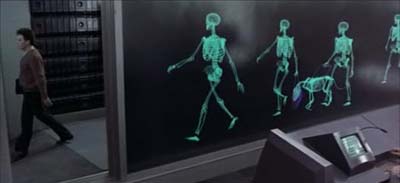Yesterday the U.S. House of Representatives voted to restrict TSA from conducting what have become known as “virtual strip-searches.” House Restricts “Strip-Search Machines” [WashingtonWatch.com]. The bill provides, among other things, that:
Whole-body imaging technology may not be used as the sole or primary method of screening a passenger under this section. Whole-body imaging technology may not be used to screen a passenger under this section unless another method of screening, such as metal detection, demonstrates cause for preventing such passenger from boarding an aircraft.
Although promoted as less intrusive than x-rays, explosive sniffers and the like, this new technology presents a significant threat to personal privacy. As the sponsor (Rep. Jason Chaffetz, R-Utah) said, “Nobody needs to see my wife and kids naked to secure an airplane.” My colleague Chris Calabrese of the ACLU makes it graphically clear:
these machines produce strikingly graphic images of passengers’ bodies when they are utilized as part of the airport screening process. Those images reveal not just graphic images of “naughty parts,” but also intimate medical details like colostomy bags.
Privacy advocacy groups are, for obvious reasons, alarmed. It is very much like the “Tunnel of Truth” hypothesized in the 1990 sci-fi film Total Recall. That was scary indeed! Not unsurprisingly, on May 31, a coalition of advocacy groups including the ACLU, the Electronic Privacy Information Center, Gun Owners of America, and the Consumer Federation of America sent a letter to Homeland Security Secretary Janet Napolitano asking her to “suspend the program until the privacy and security risks are fully evaluated.”
That will never happen. It its zeal to “protect” Americans traveling by air, TSA has turned the check-in experience into the U.S. equivalent of the Star Chamber, where ordinary citizens are presumed to be dangerous just by, for instance, wearing shoes — now routinely x-rayed separately at every U.S. airport — or putting liquids into carry-on luggage. The millimeter wave and related strip-search technologies ratchet this up yet another level. Use of a “privacy screen” to cover intimate areas is hardly an answer.
In my view, TSA is out of control. Yes, there were security lapses leading to 9/11, but they did not arise from business or vacation travelers and, with a bit more diligence (like following up on middle eastern males taking flying lessons but rejecting landing practice) the government could target those likeliest to have real terrorist connections. Just as TSA’s “no fly list” was overreaching, so is virtual body searching. We do not need this and we do not need TSA. I say abolish the agency, something with which Jim Harper of the Cato Institute, the premiere libertarian think tank, agrees.


